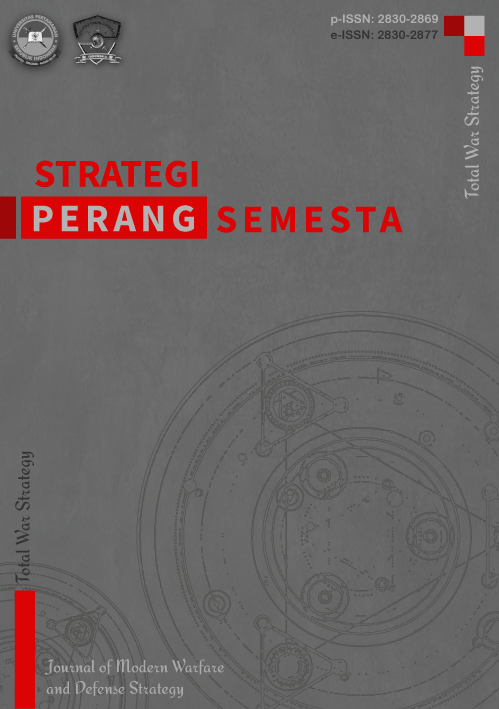Battle of Ambarawa from the perspective of the universe war strategy
DOI:
https://doi.org/10.56555/sps.v8i2.1521Abstract
The battle in Ambarawa was reasonably crucial in the history of the Struggle of the Indonesian nation because the battle of Ambarawa was one of a series of events to maintain independence during the revolution. How the application of the universal war strategy in the battle of Ambarawa is carried out by the warrior figures and the goals to be achieved in Palagan Ambarawa, and the impact resulting from the battle becomes the goal of this historical research in addition to making historical knowledge that may one day be lost. The method used in this study is a historical method that follows the flow from heuristic steps, source criticism, interpretation, and historiography. The Universal People's War Strategy or Incumbent System with Supit Urang tactics applied to the Battle of Ambarawa brought success and victory, apart from the factors of the superiority of infantry tactics and techniques, the superiority of the number of personnel deployed, the management of field administration operations Field logistics and better field health and the integration of operations involving all components of the nation. The victory in the battle in Ambarawa had a significant positive impact on the Struggle for the nation's daughters in cultivating a sense of trust in one's strength in continuing his Struggle, both militarily and politically.
References
Army Mental Development Service, Soldier Reading Series (1987). Palagan Ambarawa. Jakarta, 1987.
Daily "Suara Merdeka, December 16, 2006.
Dika Restu Ayuningtyas, R. Suharso, Ibn Sodiq (2016). The Struggle of the Commander-in-Chief General Soedirman during the Physical Revolution of 1945-1950 Journal of Indonesian History.
Fikriyah Sofa (2015). The Role of the Temanggung People's Security Army in the Struggle to Maintain Independence in 1945-1946. Journal of Temple FKIP UNS.
https://id.wikipedia.org/wiki/Palagan_Ambarawa
https://www.youtube.com/watch?v=a54KjnFNQsQ
https://www.youtube.com/watch?v=gbbvUkwLeUQ&t=509s
https://www.youtube.com/watch?v=Mkyz4iaZ1tk
https://www.youtube.com/watch?v=WHWPiWyx4aU&t=328s
Juli Suspurwanto (2020). General Sudirman's Strategic Leadership in His Service as a Soldier of the Indonesian National Army. Journal of | Total Defense Strategy Volume 6 Number 1 of 2020.
Maskur Sumodihardjo. (1974). Light From the Battlefield. Jakarta: National Daily Council.
Mental Development Service of the Indonesian Army (2014). Palagan Ambarawa, Cultivating Belief In One's Own Strength. CV. Eighteen, Bandung 2014.
Nanto Nurhuda (2021). Literature Review of the History of War in the Indonesian Total War Strategy. Journal of Research Innovation.
Novirantika, Djono, Musa Pelu (2021). The Values of the Ambarawa Battle Struggle as Strengthening Character Education in Planning Indonesian History Learning for High Schools in Semarang Regency. JOURNAL OF TEMPLE Volume 21/ No.1/Year XII/ April 2021 ISSN. 2086-2717
Nugroho Notosusanto (1984). National History of Indonesia Volume I. PN. Balai Pustaka, Jakarta 1984.
Soepardjo. 1986. Palagan Ambarawa. Semarang: True Mother.
Solichin Salam(1963). Djenderal Sudirman Hero of Independence. Pure Djaja, Djakarta.
Star Adi Kuncoro, Emy Wuryani, Sunardi (2021) . The Struggle of the Indonesian People's Rebels of Mataram (PRI MATARAM) in the Attack on Ambarawa City. IVET University e-journal.ikip-veteran.ac.id/index.php/
Downloads
Published
Issue
Section
License
Proposed Policy for Journals That Offer Open Access. Authors who publish with this journal agree to the following terms:
- Authors retain copyright and grant the journal right of first publication with the work simultaneously licensed under a Creative Commons Attribution License that allows others to share the work with an acknowledgment of the work's authorship and initial publication in this journal.
- Authors are able to enter into separate, additional contractual arrangements for the non-exclusive distribution of the journal's published version of the work (e.g., post it to an institutional repository or publish it in a book), with an acknowledgment of its initial publication in this journal.
- Authors are permitted and encouraged to post their work online (e.g., in institutional repositories or on their website) prior to and during the submission process, as it can lead to productive exchanges, as well as earlier and greater citation of published work (See The Effect of Open Access).
Proposed Policy for Journals That Offer Delayed Open Access. Authors who publish with this journal agree to the following terms:
- Authors retain copyright and grant the journal right of first publication, with the work [SPECIFY PERIOD OF TIME] after publication simultaneously licensed under a Creative Commons Attribution License that allows others to share the work with an acknowledgment of the work's authorship and initial publication in this journal.
- Authors are able to enter into separate, additional contractual arrangements for the non-exclusive distribution of the journal's published version of the work (e.g., post it to an institutional repository or publish it in a book), with an acknowledgment of its initial publication in this journal.

